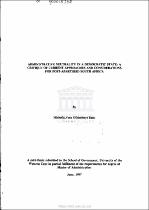| dc.description.abstract | The ideal and practice of administrative neutrality has been problematic in the public services of liberal democracies since the middle of the 19th century. Either the ideal was interpreted very narrowly to exclude public administration from political processes, or it has been too broadly incorporated to render its meaning practically useless. However, both literature and practice continue to emphasize the importance of the ideal. This study has attempted to clarify the meaning of the concept by examining its evolution and applicability in various liberal democratic states. Additionally, the study has developed a model of administrative neutrality for the post- apartheid South African public service. The study was guided by three broad assumptions: and these were: i) that the concept of administrative neutrality was not an antonym of politicization, and that whenever such meaning was imputed its applicability was bound to be compromised if not misguided; ii) that the applicability of administrative neutrality depended, among other things, on the constitutional experience and context of a given country; and that iii) administrative neutrality tended to emphasize those elements that are topical at a given time in a given country. Comparative experiences of older liberal democracies examined in the study lent support to these broad assumptions: thus, the British version of administrative neutrality has been conditioned by its political and administrative traditions in which the evolution of democratic
political institutions dictated the subjection of administrative institutions to elected political leadership. By contrast, the French experience has reflected that country's administrative history in which public administration evolved much earlier than liberal democracy, and practices like permitting civil servants to seek political office without having to resign their posts was perceived as posing no danger to the ideal of neutrality. Similarly, the American model in which the top layer of public administrators are political appointees has been a product of its history which has had a heavy dosage of partisan patronage. However, despite the differences in terms of models and applicability of the concept the public services in all older liberal democracies examined showed a clear commitment to administrative neutrality in the form
of a professionally appointed and managed public service. All the three older democracies examined here has clearly done away with the concept of patronage in the professional section of their public services. Based on the analysis of the three older democracies, a model has
been developed for post-apartheid South Africa. First, it was observed that current practices of administrative neutrality in South Africa have been heavily influenced by both apartheid and British or Whitehall traditions. However, the 1996 constitution prescribes a public service that is nonpartisan and impartial, with the public service commission as the watchdog for its implementation. The study has noted that a few problems exist in the current practice of administrative neutrality. First, the practice of involving the minister in the department or premier in the province in matters of appointing permanent staff was regarded as anomalous. Second, that there was lack of specification of involvement by level of civil servants in partisan activities. Third, that the present arrangements do not make adequate checks and balances between ministerial responsibility for personnel and the role of the public service commission, and between the minister and the director- general. Fourth and finally, the absence of the head of the civil service who could cultivate, promote and defend the ethic of civil service neutrality. The proposed model addresses these issues and includes the following elements: commitment to national goals as a recognition of the fact that administrative neutrality does not mean avoidance of national political ideals and goals; merit as the basis for appointment and promotion to ensure against the spoils system; partisan neutrality in which civil servants at all levels do not participate in any partisan activities, but that this provision could be reviewed from time to time as the country's administrative culture evolves; institutional checks and balances in which the public service commission, the head of the civil service , and the re-designing of the office and even title of the director-general. At the moment there are no really checks and balances vis-a-vis ministerial role in the civil service. Finally, the model recommends general fairness and impartiality of the civil service as part of the neutrality concept. The model might meet some resistance due to entrenched traditions of the past or misconstruing of the ideal of neutrality itself by current practitioners. The study concludes by posing a few questions: what is the relationship between neutrality and civil service effectiveness? How does the policy of representative bureaucracy (i.e.: affirmative action) impact upon the merit principle? These and other questions have not been addressed in the study due to limitation of time and resources. Nonetheless, the ideal of administrative neutrality holds out the hope for a civil service that is emerging from the scars of apartheid politicization. | en_US |

